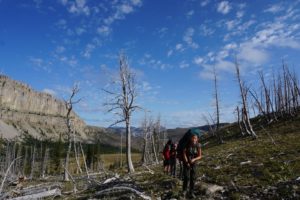
Our human civilization often seems far and disconnected from the natural world. Many of us now live in cities and get our food from the grocery store, not the land itself. Our water comes from the faucet, not the creek. We have come a long way in creating our new “human” ecosystem, and often forget about the natural world from which we came. The fact remains that we are a part of nature, and what can happen to nature can happen to us.
For the past what feels like forever, our human ecosystem has been disrupted by the COVID-19 pandemic. Life has been different, no doubt, but that is how it goes when ecosystems endure a disturbance. When a wildfire burns thousands of acres of timber, life in that burn area is changed down to the dirt. If bark beetles decimate a forest of white bark pines, the entire landscape is altered. When we walked through the Scapegoat Wilderness, we saw this disturbance firsthand, and this reminded me that both nature and humans are still vulnerable to change. This goes to show that as distant as we may seem from lodgepole pine trees and soil, we are still a part of nature and are not immune to its changes.
However, as with any disturbance, there is always a silver lining. Outdoor recreation has increased since the pandemic hit the United States. Leave No Trace reports that people are spending time outdoors more often, even people who did not recreate there before the pandemic. People are connecting with the natural and wild world that we inhabit in many different ways. More of us are hiking, looking for birds and wildlife, or tending gardens. Leave No Trace also speculates that our new habits are here to stay even after the pandemic subsides. This disturbance to our society has made us realize as a whole that we are still part of nature and there is a lot more that nature can teach us.
The concrete jungles with which we have surrounded ourselves may be a far stretch from the natural jungles and wild places around the world, but even in them, we are still connected to the earth and the sky in the same way. The principles of nature and disturbance affect us as humans the same ways they affect the flora and fauna in our favorite wilderness or park. Seeing these recently disturbed landscapes in the Scapegoat as well as in my home state of Idaho made me realize that we still behave like a natural ecosystem, because we are! Just as fireweed returns to a burn area, we will recover from the pandemic. Our soil has been fertilized by the flames of the virus, and we now have an opportunity to learn and recover better than we were before.
Conner Conigliaro is a student from Northern Idaho currently studying Environmental Studies and Spanish at Montana State University in Bozeman, Montana.